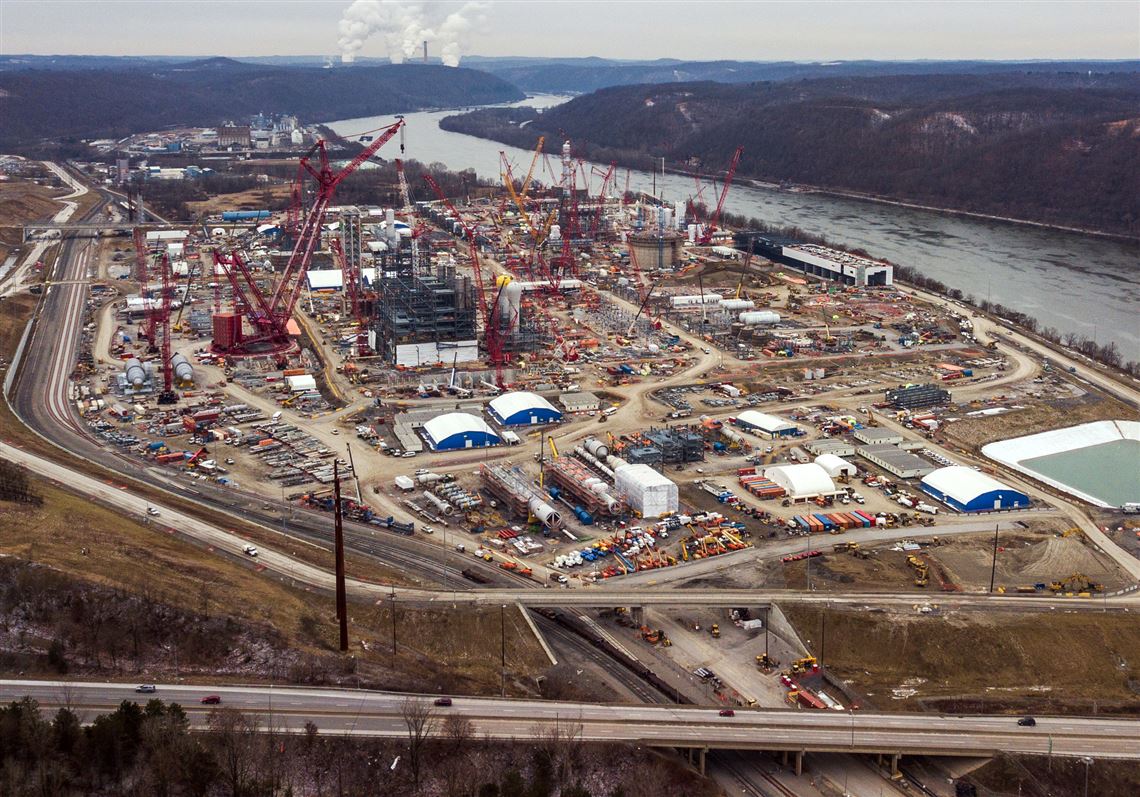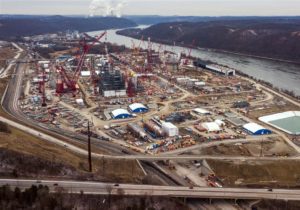
Monaca, PA (December 15, 2022) – Last night, The Pennsylvania Department of Environmental Protection (DEP) issued a notice of violation to Shell Chemical Appalachia for exceeding their rolling yearly volatile organic compounds (VOCs) limit by nearly 150 tons at their Beaver County Ethane Cracking facility. This facility emitted a total of 662.9 tons of VOCs, and is the largest VOC emitter in Beaver County. This happened immediately after a fraught startup by the facility including excessive flaring and a sickly sweet maple syrup-like odor from VOCs being released into the community.
“These pollution limits are based on worst case scenarios by the facility,” said Joseph Minott, Executive Director and Chief Counsel of Clean Air Council. “To exceed this kind of limit in such an excessive fashion is unacceptable and unprecedented in Pennsylvania and puts nearby communities in serious danger.”
VOCs are a class of harmful air pollutants that can cause eye, nose, and throat irritation; headaches and loss of coordination; nausea; and damage to the liver, kidneys, or central nervous system. In addition to health effects, they contribute to the formation of ground level ozone or smog. It appears that most of the 100 tons of excess emissions were released in one month from September to October during a period that residents have reported heavy flaring from the facility. DEP has confirmed that other emissions of harmful pollutants have increased along with VOC emissions but have not yet been exceeded.
“Clean Air Council entered into a settlement agreement with Shell in order to stop excessive VOC emissions from flares and install a fenceline monitoring system,” said Alex Bomstein, Legal Director at Clean Air Council. “DEP must now take further action and enforce the law.”
“These limits are meant to protect frontline communities from toxic pollution from the plant,” said Sarah Kula, Attorney at the Environmental Integrity Project. “The state’s notice of violation is an important step, but Pennsylvania needs to follow through to ensure these violations don’t happen again.”
By Joseph Otis Minott, Esq.
Pennsylvania Department of Environmental Protection (DEP) Secretary Patrick McDonnell will appear before the Senate Appropriations Committee on Wednesday, March 4 at 10:00 AM to present Governor Wolf’s 2020-21 budget request for the department.
Ahead of this hearing, we took a look at some of the claims and spin from industry-boosters during the Secretary’s appearance before the PA House Appropriations Committee last week.
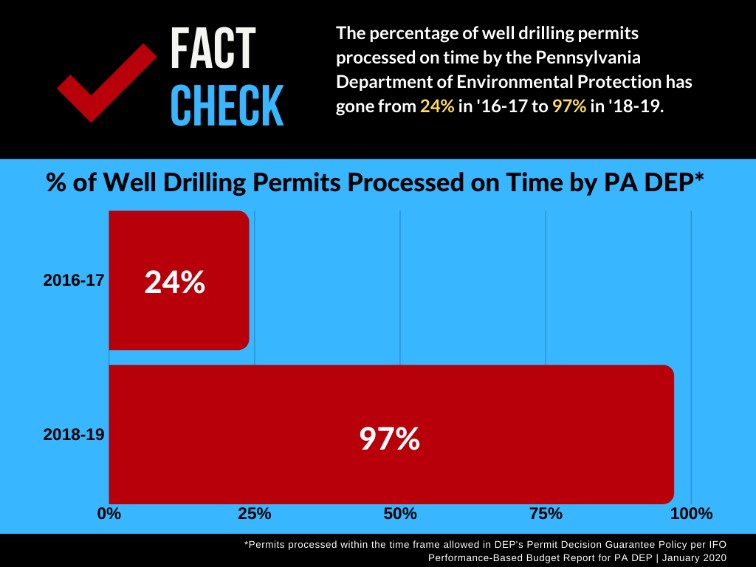
Contrary to outdated rhetoric, the PA Department of Environmental Protection has nearly eliminated the permit backlog
Rep. Keith Greiner (R-Lancaster County) raised the importance of eliminating DEP’s historical well-drilling permit application backlog but cites outdated – and misleading – numbers. There was indeed a DEP permit backlog in July 2017, caused in part by deficient permit applications filed by industry consultants. The good news is that, today, the backlog has been all but eliminated.
After DEP publicly committed itself to reducing the permit backlog, the number of backlogged permits has been cut from 8,715 down to 512 by December 2019. That is a backlog reduction of 94%. Considering that there are often questions and issues that arise in the permitting process that may lengthen the review time in order to ensure health and safety, that is tremendous progress.
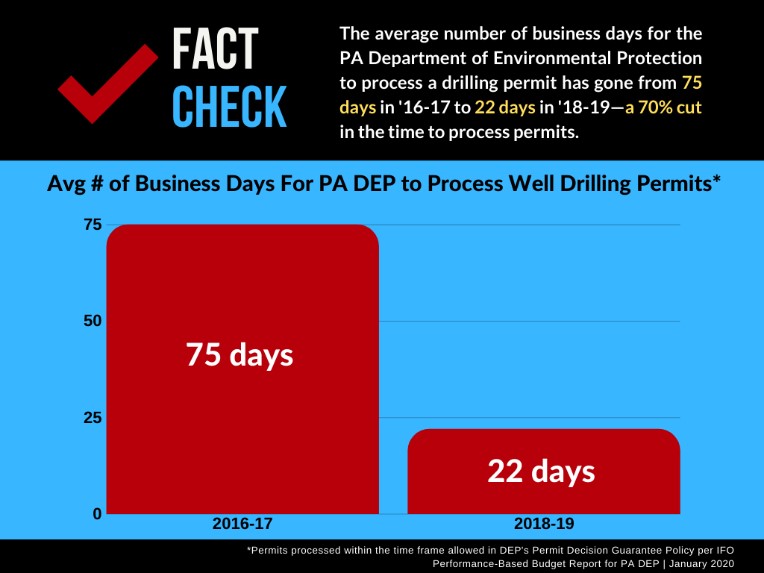
DEP’s commitment to speed up permit review comes through in the numbers:
- The percentage of well drilling permits processed on time has gone from 24% in 2016-17 to 97% in 2018-19
- The average number of business days to process a drilling permit has gone from 75 days in 2016-17 to 22 days in 2018-19, a 70% reduction
- In the SW region, processing time dropped from 112 days in 2016-17 to 27 days in 2018-19
As Rep. Greiner noted, “we want good numbers when we make budget decisions . . .”
Well, if you are the oil and gas industry, you should be pretty happy with those numbers.
Pennsylvania’s methane problem gets downplayed, state representative focuses on downstream emissions
Rep. Jesse Topper (R – Bedford/Franklin/Fulton) discussed what he called a 12 percent reduction in methane levels since 2005, which he stated (quoting the EPA) was “largely due to decreases in emissions from distribution, transmission and storage of natural gas.”
For a few reasons, that statement is incomplete and leads to the false conclusion that no additional action is needed to control methane emissions.
First, that statistic does not reflect methane emissions from the oil and gas upstream production, where the vast majority of emissions are produced. Consequently, Gov. Tom Wolf has proposed a rule that would cut methane emissions from the thousands of existing sources of oil and gas pollution in Pennsylvania, including well sites and compressor stations, which constitute the bulk of the methane pollution problem in the commonwealth.
Second, according to EPA estimates, methane emissions have decreased only 1 percent over the last several years. Industry is simply not getting the job done.
More importantly though, EPA estimates vastly understate methane pollution. According to a 2018 Environmental Defense Fund analysis, oil and gas-related methane emissions in Pennsylvania are estimated to be five times higher than industry-reported data, totaling a whopping 520,000 tons of methane per year. The annual climate impact of this pollution is greater than that from all of the cars in Pennsylvania combined.
The bottom line: Gov. Wolf and DEP are on the case, taking concrete action. Pennsylvania remains the second-largest natural gas producing state in the U.S. and third-largest greenhouse gas polluting state in the nation, and significant improvement is essential to reduce its role in contributing to climate change. Cherry-picking stats to mislead and misrepresent real progress does not help Pennsylvanians or anyone supporting climate action.
Joseph Otis Minott is the Executive Director and Chief Counsel of Clean Air Council.
Hear how Southwest PA Neighbors for Clean Air group leader Julie DiCenzo became involved in environmental advocacy and how the Neighbors campaign has benefitted her and her community:
Julie: I graduated from The Ohio State University, School of Allied Medical Professions, with a B.S. degree in medical communications, and moved to the Washington D.C. area where I worked as a medical writer and editor with International Medical News Group (Rockville, MD) for many years. I was the Cleveland Bureau Chief for 3 years and then the Pittsburgh Bureau Chief, and I traveled all over the United States covering medical conferences. I then went on to freelance and have continued writing and editing manuscripts, pamphlets, and websites.
My husband is a “yinzer” and we moved to Leet Township, PA in 1989 from Ohio. My family then moved to Bell Acres in 2007 and we have several acres of land. So I have lived in the Sewickley Valley area for 30 years.
The happy “bubble” I was living in burst several years ago when a shale gas company landman was making the rounds trying to get folks in Bell Acres to lease their land for fracking. The president of our newly-formed homeowners association was pushing our small neighborhood to lease all our land, including the 30 acres of wooded community property behind our homes. I had to quickly educate myself about fracking to counter the arguments being thrown our way. Here’s what I was regularly told: “Fracking is all a mile or so underground so you won’t notice a thing; everyone else is leasing so your gas is going to get sucked out anyway and you might as well get paid for it; just think of all the money you can make;” and on and on. After several somewhat contentious neighborhood meetings, my husband and I and a few other neighbors were able to convince the rest of the community that leasing would be a bad decision.
In the meantime, our local newspaper ran an article about the Shell ethane “cracker” plant under construction in Beaver County—only about a dozen miles away from the heart of Sewickley—and it mentioned a local group called Communities First-Sewickley Valley. I followed up and ended up joining that group, whose mission statement is to protect health, safety, and the environment in the Sewickley Valley area, and raise awareness about the Shell petrochemical plant and the effects of fracking on air and water quality and public health.
Communities First-Sewickley Valley has been partnering with the Breathe Project and its community collaborators. Since I’ve been a part of Communities First, we’ve had many educational meetings on a variety of topics such as “What to Do When the Landman Comes Calling,” “The Shale Gas Industry and Our Health,” and “The Plastic Apocalypse.” We’ve also been working with Food and Water Watch on a municipal ordinance project throughout the Sewickley Valley and beyond to strengthen local oil and gas ordinances and make them more protective.
Communities First has two types of air monitors set up in the heart of Sewickley and we’ve been working with Carnegie Mellon University and Allegheny County Clean Air Now (ACCAN) to collect baseline air quality measurements. Once the Shell petrochemical plant starts up, we will continue to monitor any changes in air quality in Sewickley and compare these with the ongoing measurements in the rest of the network set up in the Ohio River Valley, the Pittsburgh area, and beyond.
Through educational meetings and community projects, I’ve had the privilege of working closely with the folks in the Beaver County Marcellus Awareness Community (BCMAC), Citizens to Protect the Ambridge Reservoir (CPAR), and Food and Water Watch. What starts out as casually seeing and meeting people at meetings develops into stronger bonds of purpose– we are all allied together working toward the same goals of clean air and water and preserving the characteristics of our communities that make them unique and special to us.
Somewhere along the way I heard about the Clean Air Council Southwest PA Neighbors for Clean Air and was interested in what they do. So I met up with Dave Smith at the local bagel shop and he was kind enough to “train” me and provide me with all the materials and support I needed to start a study group.
What I’ve enjoyed most about the Southwest PA Neighbors for Clean Air is the feeling of empowerment—how small community groups can work at the grassroots level to help get residents involved, even if it’s just encouraging them to start going to their borough or township meetings. I’ve come to learn that municipal ordinances are really where it all starts—even though it’s not a glamorous topic, local municipal oil and gas ordinances set the stage for what happens with fracking and the petrochemical buildout threatening our communities. It’s been a great feeling going to municipal meetings where residents have stepped up and made their voices heard—it’s really seeing democracy in action.
For example, I started attending Franklin Park Council meetings when word got out that their council was considering signing a shale gas lease for Linbrook Park. Some of the residents had been faithfully attending their municipal meetings for months and even years, and they were quietly working behind the scenes. They organized a larger group, held community meetings with impressive turnout, and ultimately they were able to stop their council from leasing those 80 acres of public park land for fracking. Now they are working to further protect residents by amending an oil and gas ordinance that was put into play just last December.
Economy Borough is across the county line near my home in Bell Acres, I’ve also been attending their meetings and working with Economy residents who are trying to stop a local shale gas drilling company (PennEnergy Resources) from using their residential road as the access road to a drilling well pad. Residents are also trying to persuade Economy Council that they need to amend their very permissive oil and gas ordinance, which allows surface shale gas drilling in areas zoned residential-agricultural–encompassing much of the land in Economy. The PennEnergy well pad already has its DEP permits and will be located less than 700 feet away from homes in the neighborhood of Orchard Estates. Some residents and I canvassed there and in other nearby neighborhoods where nothing at all was known about the planned well pad. We distributed flyers and signs (thanks to Clean Air Council for the signs) and got folks to sign a petition.
With the guidance of Lisa Graves-Marcucci of the Environmental Integrity Project, a large group of residents was alerted and mobilized and they descended upon the next council meeting, making a big impact. The crowd filled the room to capacity and overflowed out into the hallway—it was the largest crowd the council ever had at one of their meetings and I think it woke them up to take their residents’ concerns seriously.
When we discuss the unit each month at my Southwest PA Neighbors for Clean Air meeting, I am able to pass on to the group that these local actions can actually affect the big picture, which is often cast as a “David versus Goliath” situation. There are so many groups and so many ways to become involved—you could find a meeting to attend somewhere every day if you wanted to, and your level of participation is up to you. My Sewickley group is small with typically only three or four of us, but my group members say they are now having conversations about fracking and the petrochemical buildout with their friends and neighbors—something that was never really talked about here before. We all had been living in our bubble, mistakenly thinking that what was going on in Beaver County was “far away” and not really affecting us. In fact we are all breathing the same bad air, and in the case of the Ambridge Reservoir, many of us are also drinking water from the same source, a source now under threat from the Shell Falcon pipeline.
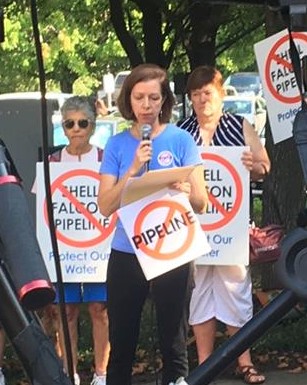
If you, like Julie, are interested in empowering your community by learning about and taking action on issues that threaten your health and the quality of life in your community, considering joining the Southwest PA Neighbors for Clean Air. Contact Dave Smith (dsmith@cleanair.org or 412-954-8494), Kelly Yagatich (kyagatich@cleanair.org or 412-723-7055), or Jay Walker (jwalker@cleanair.org or 412-532-9194) to learn more about how you can start or join a group in your neighborhood.
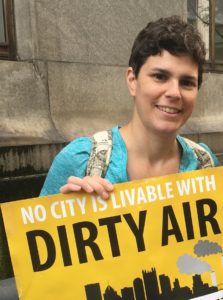
April Clisura is a longtime resident of Pittsburgh’s Greenfield neighborhood. Over the past year, April has become a leader of the Southwest PA Neighbors for Clean Air initiative by organizing residents of the Greenfield neighborhood around air quality concerns. Although her group started with only a few members, they have completed the 9-month Neighbors curriculum and are continuing to meet and advocate for cleaner air in their neighborhood and in all of Allegheny County. Group members have written letters to county officials, attended rallies and events, canvassed with Clean Air Council, and had letters to the editor published in the Pittsburgh Post Gazette calling for action on a number of air quality issues.
To better get to know April and the Neighbors program, we asked her a few questions:
How did you get involved with the Southwest PA Neighbors for Clean Air?
“In the summer or 2017, I began to notice a horrible smell day after day coming in my open windows. At first I thought it must be coming from my next door neighbor’s house because they had just cleaned out their basement and put out a lot of junk in the yard. Soon I realized it was coming on the wind and I could smell it in various places around the neighborhood. I made my first complaint phone call to ACHD. Coincidentally, I saw a flier in my church for an educational presentation about “local sources of pollution in the Squirrel Hill area” that piqued my interest. Soon after, Imade my connection with Clean Air Council.”
Were you concerned about air quality prior to Southwest PA Neighbors for Clean Air or are you new to air quality activism?
“I would call myself a newbie. Prior to 2017, I had awareness of environmental justice issues and the anti-fracking campaigns through my general work in nonprofit management and community development. But I did not realize how much fracking would come to affect my county or its connection with the petrochemical industry. I also did not realize how the poor air quality of Allegheny County is connected to rather flagrant violations of the permits and regulations governing the major industrial facilities.”
How did you build your Southwest PA Neighbors for Clean Air group?
“I was lucky that several people were posting comments on Nextdoor.com about the same smells in the air that I was noticing. I was able to message those people and invite them. Starting with only 3 of us at the first meeting, we continue to form the core of the Greenfield Neighbors for Clean Air one year into the process. We have had 3 additional people regularly join us and 3 or 4 other people have attended one meeting. Some came from word of mouth referrals. We continue to experiment with communication and meeting formats that will bring people to meet up instead of being inactive on our email list. At the same time, myself and some of my group members have engaged in really constructive dialogues with our neighbors on Nextdoor.com. I feel like a lot of education is happening there.”
What are your hopes going forward in the Neighbors initiative?
“From what we have seen on our neighborhood social media, there are dozens of people, who after moving to Pittsburgh, are noticing the smell of the air or are experiencing chronic allergies or respiratory irritation for the first time in their lives. Getting people from angry to action is a challenge. Hopefully more and more people will learn that they can take a simple action, like calling the health department or reporting on the SmellPGH app. I also want to see a paradigm shift where we end the too-heavy reliance on weather patterns to disperse pollutants in the air and finally stop pollution at the source. Polluters need to pay the true cost of doing business. Another paradigm shift would be to align trade and industrial unions with public health advocates and climate change watchdogs to refocus economic development on clean jobs and to pressure dirty facilities to pollute much less.”
If you are interested in learning more about the Southwest PA Neighbors for Clean Air, contact Dave Smith (412-954-8494, dsmith@cleanair.org), Kelly Yagatich (412-723-7055, kyagatich@cleanair.org) or Jay Walker (412-532-9194, jwalker@cleanair.org).
December 3, 2017 [Pittsburgh, PA] – Residents in the Mon Valley and Pittsburgh urged U.S. Steel to stop appealing fines for air pollution violations and focus on fixing the long violating Clairton Coke Works. The Allegheny County Health Department held a hearing today on U.S. Steel’s appeal of ACHD’s $1,000,000 fine for hundreds of recent violations at the Clairton Coke Works.
“Residents in the Mon Valley have long suffered from years of poor air quality caused by U.S. Steel’s violations. It’s time for U.S. Steel to invest in our health and jobs in the Mon Valley instead investing in their high-priced lawyers,” said Clairton resident Miriam Maletta.
“I’m glad to see that our Health Department is taking action against U.S. Steel for these violations, but when are we going to see U.S. Steel focus on cleaning up their plants? Pittsburgh residents should not have poor air quality because of one company thinking they are above the law,” said Clairton resident Melanie Meade.
Air quality scientists at Carnegie Mellon University have conducted detailed studies of air quality in Allegheny County, finding that U.S. Steel’s Mon Valley plants are significantly impacting air quality in over half the county, including in Pittsburgh’s East End. The Environmental Protection Agency (E.P.A.) ranks areas downwind of the Clairton Coke Works in the top 2% nationally for cancer risk from toxic air pollution.
Geoff Bland, a community organizer with Clean Water Action stated, “U.S. Steel has been given many years to fix their plant, and still they put out illegal levels of pollution that can make people sick. If U.S. Steel wants to be a good neighbor in Allegheny County, they need to show us they can run this plant in compliance with the law.”
“U.S. Steel has treated Pittsburgh’s skies as its dumping ground for decades, filling our lungs with chemicals that can cause cancer and asthma. It’s past time for the company to face serious consequences for their long history of disregard for the health of the city that built them,” said Zachary Barber, the Clean Air Advocate with PennEnvironment Research and Policy Center.
In June 2018, ACHD issued an enforcement order against U.S. Steel for multiple and repeated violations of the Clean Air Act, including increasing emissions violations and active attempts of U.S. Steel employees to disrupt official inspection. The order came with $1M in fines, orders for more rigorous monitoring and a 60-day deadline to improve compliance or face a temporary freeze on operations of the dirtiest parts of the plant.
“U.S. Steel’s illegal pollution poses a real risk to the thousands of people who live within 3 miles of the plant and the many more who live in the path of the company’s toxic plume,” said Kelly Yagatich, Outreach Coordinator for the Clean Air Council.
This is not the only time the coke works has been cited for breaking the law. A separate enforcement action in October 2018 brought $620,000 in fines for further increases in the number of violations. The Health Department also cited the facility for an average of more than 3 violations per day for a period of 4 years starting in 2011.
“U.S. Steel has been given years to fix the problem, but chose to continue breaking the law,” said Rachel Filippini, Executive Director of the Group Against Smog and Pollution (GASP).
As one of the largest regional polluters, the Clairton Coke Works has long been the subject of public outcry. The facility ranked #3 on PennEnvironment’s Toxic Ten ranking of the dirtiest polluters in the county and was the subject of lawsuits by PennFuture and others.
“A $1 million dollar fine might sound like a lot, but it really represents only 8 one thousandth of a percent US Steel’s $12.2 billion in revenue last year, said Matt Mehalik of the Breathe Project. “This would be like fining the average Pittsburgh family $6.09. The fact that U.S. Steel is appealing this enforcement action instead of fixing the problem is disappointing.”
